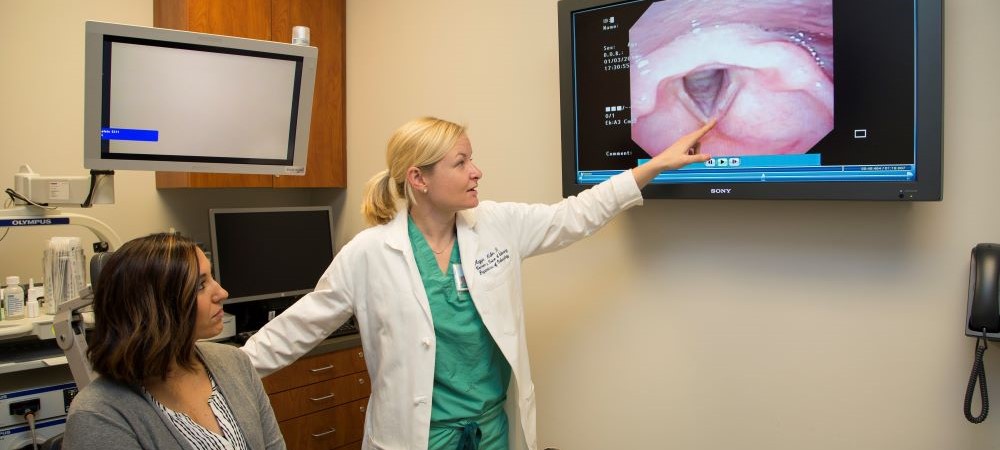Top Motivations to See an ENT for Persistent Sinus and Throat Problems
Top Motivations to See an ENT for Persistent Sinus and Throat Problems
Blog Article
Exploring the Field of Otolaryngology: What to Expect When You Speak With an ENT
Otolaryngology, frequently referred to as ENT, incorporates the diagnosis and therapy of throat, nose, and ear conditions. For those experiencing related concerns, speaking with an ENT professional can offer quality and alleviation. Understanding what to expect throughout such examinations is vital for effective communication and care. This overview will certainly outline crucial facets of the ENT experience, including common factors for sees and the procedures entailed in diagnosis and therapy.

Comprehending Otolaryngology: A Review
Otolaryngology, usually described as ENT (Throat, nose, and ear) medication, is a customized branch of medicine that concentrates on the medical diagnosis and treatment of problems affecting these essential locations of the human body. This area includes a wide variety of disorders, including those pertaining to hearing, equilibrium, respiratory system feature, and speech. Otolaryngologists are trained to handle both surgical and medical therapies, utilizing innovative methods and innovations. Their expertise extends past standard conditions, attending to issues such as allergies, sinus infections, and hearing loss. Furthermore, they play an important role in the monitoring of head and neck cancers, offering comprehensive treatment tailored to private person requirements. Overall, otolaryngology continues to be vital for maintaining health and high quality of life in afflicted people.
Common Factors to See an ENT Specialist
Many individuals look for the expertise of an ENT professional for a selection of reasons, showing the varied nature of conditions that influence the throat, nose, and ear. Common concerns consist of chronic sinusitis, which typically brings about consistent nasal congestion and facial pain. Allergic reactions and their linked symptoms, such as sneezing and itching, also prompt visits to these experts (ENT Clinic). Hearing loss, whether progressive or unexpected, is an additional substantial reason for assessment. On top of that, individuals might look for analysis for throat problems, including relentless hoarseness or swallowing troubles. Sleep apnea, characterized by disrupted breathing throughout rest, is often dealt with by ENT professionals. Each of these conditions highlights the importance of specialized treatment in managing intricate ENT-related wellness problems
Planning for Your ENT Visit
When planning for an ENT appointment, it is important to collect relevant info and consider any specific worries. Clients should put together an in-depth clinical history, including previous ear, nose, or throat problems, surgical procedures, and current medicines. Recording signs and symptoms-- such as period, severity, and regularity-- can offer important understandings for the ENT professional. Furthermore, people need to prepare a checklist of questions they want to ask, guaranteeing that all concerns are addressed during the browse through. Bringing along any type of appropriate clinical documents or test results can even more help the ENT in understanding the individual's problem. People need to verify their visit information, including time, location, and date, to reduce any type of last-minute complication. Correct prep work can improve the efficiency of the appointment and lead to better end results.
What to Anticipate During the Consultation
As the assessment begins, the patient can expect to take part in a complete discussion with the ENT professional regarding their signs and case history. The professional will inquire about the period, frequency, and seriousness of symptoms such as hearing loss, nasal blockage, or sore throat. Additionally, the patient's previous medical problems, medicines, and any pertinent household background will certainly be evaluated, aiding the professional in developing a complete understanding of the patient's wellness. The ENT might also inquire about lifestyle variables, such as exposure to irritants or allergens. This open discussion develops a foundation for the assessment, making sure that the person's problems are dealt with and establishing the stage for any necessary assessments or recommendations for treatment.
Analysis Examinations and Procedures in Otolaryngology
A series of diagnostic examinations and procedures are important in otolaryngology to properly assess and identify problems impacting the throat, nose, and ear. Typical examinations include audiometry, which determines hearing function, and tympanometry, assessing middle ear pressure. Nasal endoscopy allows visualization of the nasal passages and sinuses, while laryngoscopy analyzes the throat and vocal cables. Imaging strategies, such as CT scans and MRIs, offer thorough sights of head and neck structures. Allergic reaction testing might also be carried out to identify triggers for sinus or breathing issues. These diagnostic tools allow ENT experts to create an extensive understanding of people' conditions, making sure tailored and efficient administration plans. Appropriate medical diagnosis is important for successful therapy end results in otolaryngology.
Therapy Alternatives Offered by ENT Specialists
ENT professionals offer a variety of treatment choices customized to deal with details conditions affecting the ear, nose, and throat. These treatments range from conventional approaches, such as medicine and way of living adjustments, to even more intrusive treatments. As an example, allergic reactions might be handled with antihistamines or immunotherapy, while persistent sinusitis might require nasal corticosteroids or sinus surgical treatment. For hearing loss, ENT professionals commonly recommend hearing help or medical treatments like cochlear implants. In situations of throat problems, choices can consist of speech treatment or medical treatments to get rid of obstructions. Additionally, they may offer support for managing sleep apnea, consisting of making use of CPAP gadgets or medical interventions. In general, the more info goal is to boost individuals' high quality of life through customized treatment and efficient therapy strategies.
When to Look For Follow-Up Treatment With an ENT
Recognizing when to seek follow-up treatment with an ENT specialist is vital for taking care of recurring signs or difficulties connected to throat, nose, and ear problems. People should think about scheduling a follow-up visit if symptoms persist regardless of first therapy, such as chronic ear pain, nasal congestion, or throat pain. Modifications in hearing, equilibrium issues, or unusual nasal discharge might also require more assessment. Furthermore, if a patient experiences negative effects from prescribed drugs or has actually gone through a surgery, follow-up treatment is necessary to check recuperation and address any type of concerns. Timely examinations can assure efficient administration of conditions, avoid potential problems, and offer tranquility of mind concerning one's wellness. Looking for follow-up treatment promotes positive wellness management in otolaryngology.
Frequently Asked Questions

What Credentials Should I Try to find in an ENT Specialist?
When looking for an ENT specialist, one must look for board qualification, appropriate experience, and strong individual evaluations. In addition, effective communication abilities and a thoughtful technique can significantly enhance the overall treatment experience.
Exactly how Do I Pick the Right ENT for My Requirements?
Selecting the appropriate ENT specialist includes reviewing their certifications, experience, and individual testimonials (ENT Clinic). It is vital to ponder their communication design and strategy to treatment, guaranteeing they straighten with the person's specific health and wellness demands and preferences
Are There Any Kind Of Risks Connected With ENT Procedures?
The dangers connected with ENT treatments may consist of infection, blood loss, anesthesia complications, and prospective damages to surrounding frameworks. Clients ought to go over these dangers with their physician to understand individual concerns and guarantee notified choices.
Just How Can I Take Care Of Anxiety Prior To My ENT Visit?
To handle stress and anxiety before an appointment, individuals can exercise deep breathing exercises, picture favorable end results, prepare concerns in breakthrough, and seek support from pals or household, promoting a sense of peace of mind and calmness.
What Should I Do if I Experience Adverse Effects From Treatment?
The individual should quickly report them to their healthcare company if side effects from therapy happen. Modifications to treatment or added interventions might be required to ensure safety and security and performance in managing their problem - Sinus. As the consultation starts, the client can expect to engage in a detailed discussion with the ENT expert regarding their signs and clinical background. These diagnostic devices enable ENT professionals to develop a detailed understanding of patients' problems, making sure tailored and reliable management strategies. ENT specialists use a variety of treatment choices customized to deal with details problems impacting the throat, nose, and ear. When looking for an ENT professional, one ought to look for board accreditation, pertinent experience, and strong individual reviews. Choosing the ideal ENT professional includes examining their qualifications, experience, and client evaluations
Report this page